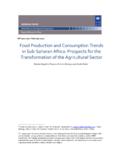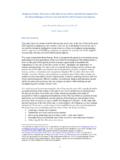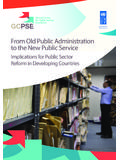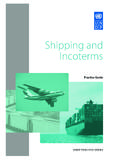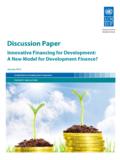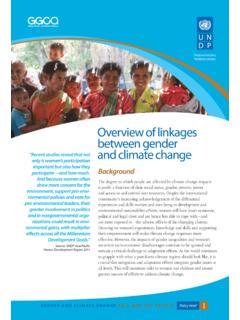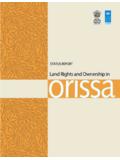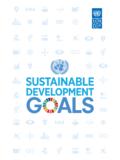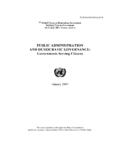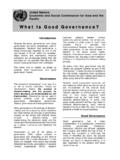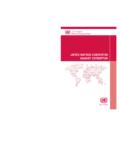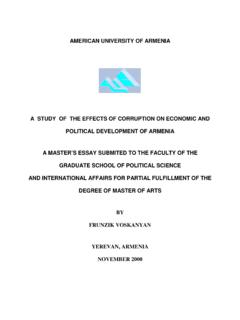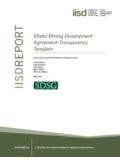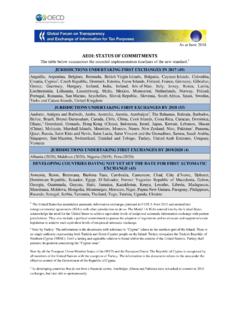Transcription of Discussion Paper - United Nations Development …
1 Discussion Paper Governance for Sustainable Development Integrating Governance in the Post-2015 Development Framework March 2014. The Millennium Declaration['s] core values of human rights, the rule of law and democratic governance remain as valid as ever, both as fundamental for defining a life in dignity for all human beings, and as an enabling framework for efforts to expand the benefits of human progress to all .. Source: Accelerating Achievement of the MDGs by Ways and Means of Economic and Social Rights, (UNDP 2012). Although the Millennium Development Goals (MDGs) did not include a goal or targets on governance, the Millennium Declaration, adopted by the world's leaders in 2000, recognized the vital link between good governance, Development and human rights.
2 Based on over a decade of experience with Development progress and challenges, there are now widely accepted arguments that governance should play a stronger role in the post-2015 Development agenda: effective governance institutions and systems that are responsive to public needs deliver essential services and promote inclusive growth, while inclusive political processes ensure that citizens can hold public officials to account. In addition, good governance promotes freedom from violence, fear and crime, and peaceful and secure societies that provide the stability needed for Development investments to be sustained. Women are crucial partners in all these processes.
3 Hence, governance enables the achievement of a range of critical Development objectives. At the same time, as many surveys and much citizen action demonstrate, effective and accountable governance is also seen by many as an important end in itself. Since the MDGs, many Member States have entered into global or regional agreements that involve commitments to improve governance, as well as human rights, peacebuilding, rule of law and transparency. Examples of such commitments include: the African Peer Review Mechanism, the g7+. Peacebuilding and State-building goals in the New Deal, The UN Convention against Corruption (UNCAC), the Extractive Industries Transparency Initiative, the Universal Periodic Review Mechanism of the Human Rights Council, the African Charter on Democracy, Elections and Governance, the Inter- American Democratic Charter and the Istanbul programme of Action for the Least Developed Countries.
4 Mongolia and a few other countries have also added an extra MDG 9 on Good Governance. These agreements and country initiatives have promoted efforts to systematically track and measure governance goals and targets and confirm that such goals and targets are integral to the overall Development vision of many countries. The ongoing discussions around a post-2015 Development framework are based on a recognition that current Development challenges are more complex than they were 15 years ago. For Development to be sustainable - economically, socially and environmentally and equitable, a new approach is needed that addresses the political, as well as the technical, aspects of Development solutions.
5 Improved governance across many dimensions is a key part of this new approach. Governance is broader than institutions and includes relations between state and people. It provides the mechanisms through which collaboration can be generated across sectors. It also addresses some of the fundamental obstacles to sustainable Development including exclusion and inequality. 2 Governance for Sustainable Development There is growing acceptance that the one-size-fits-all models of governance do not work and that there are diverging pathways towards more inclusive political and economic institutions. In addition to the quality of governance at national and sub-national levels, there is also now greater attention to global governance issues.
6 The repercussions of the international financial crisis, the effects of climate change, the spill-over from intra-state conflict and impact of international crime, terrorism and illicit financial flows have raised attention to the importance of cross-border governance issues, in a world that is increasingly interconnected and more interdependent. While this Paper focuses on governance at the national level (relevant in all countries), improving governance is important at national, regional and global levels. Areas that require attention in the context of the broader post-2015 process include representation and voice of developing countries in international financial institutions, making the rules governing access to markets and technology more fair and equitable, taking steps to curb illicit financial flows, and strengthening global cooperation around migration.
7 The strongest endorsement of the importance of governance as a Development outcome for the post-2015 agenda came from a series of national and global consultations, including a global survey that engaged the perspectives of nearly 2 million people: People call for a new agenda built on human rights and universal values of equality, justice and security. Better governance underpins many of their calls.' (A million voices: The world we want: Presentation of the report's key messages). Given the centrality of governance to people's vision of a post-2015 Development framework, this Discussion Paper aims to (1) provide evidence of the link between governance and Development and (2) analyse some of the leading positions on how best to integrate governance and the rule of law into the post-2015 Development framework.
8 Governance and Sustainable Development In July 2012, Member States reaffirmed good governance as a foundation for Development : Democracy, good governance and the rule of law at the national and international levels, as well as an enabling environment, are essential for sustainable Development including sustained and inclusive economic growth, social Development , environmental protection and the eradication of poverty and hunger (General Assembly resolution 66/288). Perspectives from many people coming out of surveys, like My World' and consultations on The World We Want', show that the quality of governance has a profound effect on sustainable Development .
9 A majority of the people consulted voted for an honest and responsive government'. among their top priorities. Deficits in the controls on power and the exercise of authority lie at the core of Development challenges, including weak state capacity, social and political violence, conflict over natural 3 Governance for Sustainable Development resources, stresses on citizen security, and environmental sustainability. The quality of governance plays a defining role in supporting the pillars outlined in Realizing the Future We Want for All' 1, which advocates for an approach to the post-2015 Development framework that is based on: (1). inclusive social Development ; (2) inclusive economic Development ; (3) environmental sustainability.
10 And (4) peace and security. Inequality and poverty are not accidents of fate. They are the results of policy decisions and power relationships which are discriminatory, exclusionary and unjust'. (Participant in the global consultations on governance for the post-2015 agenda). The post-2015 Development framework, therefore, needs to identify and address the multiple drivers of exclusion and inequality within political, economic and social systems, and support the means to foster inclusiveness and equality. Underpinnings of good governance To ascertain whether governance is good', actors look at the mechanisms that promote it, the processes used, and the outcomes achieved.

